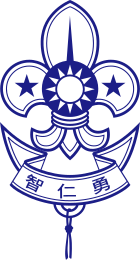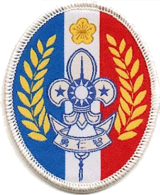Scouts of China
| Scouts of China | |||
|---|---|---|---|
 Scout Of China (Taiwan) | |||
| Headquarters | Hall of the Scouts of China | ||
| Location | Zhongshan District, Taipei | ||
| Country | |||
| Founded |
| ||
| Founder | Yen Chia-lin (嚴家麟) | ||
| Membership | 53,972 (2021) | ||
| Chief Scout | President Lai Ching-Te (賴清德) | ||
| Chairman and Chief Commissioner | Lin, Min-Yu(林明裕) | ||
| Affiliation | World Organization of the Scout Movement | ||
|
| |||
| Website www | |||
| Scouts of China | |||||||
|---|---|---|---|---|---|---|---|
| Traditional Chinese | 中華民國童軍 | ||||||
| |||||||
| The General Association of the Scouts of China (Taiwan) | |||||||
| Traditional Chinese | 中華民國童軍總會 | ||||||
| |||||||
The Scouts of China or the General Association of the Scouts of China (Taiwan) in full, is the National Scouting Organization (NSO) of the Republic of China (Taiwan) and represents the Scouting organization in Taiwan. It is a member of the World Organization of the Scout Movement since 1937. In 2021, the Scouts of China had 53,972 members.[1]
History
[edit]
Mainland China (1912–1949)
[edit]Following the birth of the Republic of China, the first Scout troop was organized by Reverend Yen Chia-lin in Wuchang on February 25, 1912, and the Scouting movement spread rapidly all over the country.[2]
The General Association of the Scouts of China was formally established in Nanking, the former capital of the Republic of China in 1934, and became a member of the International Scout Bureau in 1937.[3][4] Many Scouts actively participated in the Second Sino-Japanese War from 1937 to 1945.
There were 570,000 registered members in 1941.[2]
Japanese military authorities did not consistently encourage the Scouting movement in occupied territories. Where local conditions were favorable, authorities would permit local Scouting or introduce Japanese-style Scouting, or Shōnendan, and sometimes even made this compulsory. On the other hand, where conditions were not favorable, and anti-Japanese sentiments were likely to be nurtured through Scouting, the authorities would prohibit it entirely. Taiwan was a colony of the Empire of Japan from 1895 until 1945, and Taiwan Boy Scouts/Shōnendan and other forms of pro-Japanese youth education had been introduced. Conversely, a number of Taiwanese boys were formed into a Shōnendan-style boy corps called Taiwan Shaoniantuan from 1939 through the 1940s to assist in Chinese resistance in the Second Sino-Japanese War.[5]
Scouts of China in Taiwan (1945–)
[edit]
In 1945, Chinese administration of Taiwan began. A few years later, in 1949 the ROC government relocated to Taiwan, where it remains today. However, Scouting has continued in Taiwan to this day under the name Scouts of China.[2][4][6]
Program
[edit]
There are five programs or sections in the Scouts of China.[7] They are Beaver Scout (稚齡童軍), Cub Scout (幼童軍), Scout (童軍), Senior Scout (行義童軍) and Rover Scout (羅浮童軍).
Beaver Scout is served for the children aged 6 to 8 including three ranks: Star (星星), Moon (月亮) and Sun (太陽).
Cub Scout is served for the children aged 8 to 12 including four ranks: Anor now, Scouts of China are promoting the development of Sea Scouts.[8]
See also
[edit]- Scouting and Guiding in mainland China
- The Scout Association of Hong Kong
- The Scout Association of Macau
- Girl Scouts of Taiwan
- Sun Li-jen
- Yang Huimin
- World Buddhist Scout Brotherhood
Footnotes
[edit]References
[edit]- ^ "WOSM's Membership Census | Scout Learning Zone". learn.scout.org. Retrieved 2023-11-30.
- ^ a b c "SCOUTING IN CHINA-SCOUTS OF CHINA". N2ZGU. Retrieved 2008-10-24.
- ^ WOSM (1990). Scouting ´Round the World. Geneva: Public Relations and Communications Department, World Scout Bureau. p. 150. ISBN 2-88052-001-0.
- ^ a b Michel, Rudi; Reinhard Schmoeckel; Hans Gerhard Rumpf (1963). Der Kornett Heft 5 Pfadfinderbewegung (in German). Minden: Bund Deutscher Pfadfinder Landesmark Westfalen. p. 51.
- ^ http://www.scout.org.hk/article_attach/14529/p14.pdf War and Occupation, 1941–1945 by Paul Kua, Deputy Chief Commissioner (Management), Scout Association of Hong Kong, 2010
- ^ WOSM (1990). Scouting ´Round the World. Geneva: Public Relations and Communications Department, World Scout Bureau. p. 27. ISBN 2-88052-001-0.
- ^ "中國童子軍進程合格標準". Scouts of China (in Traditional Chinese).
- ^ 蘇芳賜 (2015-08-21). "海童軍體驗聯團活動圓滿閉幕" (in Traditional Chinese). Akau News.
Further reading
[edit]- Facts on World Scouting, Boy Scouts International Bureau, Ottawa, Canada, 1961




